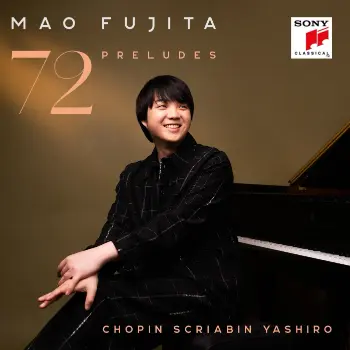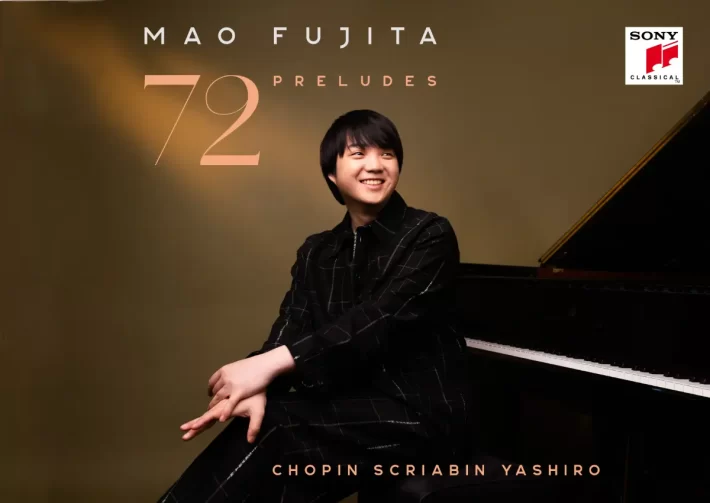Fujita Mao’s ambitious project pairs the complete Chopin Preludes with Scriabin’s. But what sets this album apart is an additional set of 24 preludes for piano by the Japanese composer, Akio Yashiro. This choice goes beyond mere novelty: Fujita comments on how Akio establishes specific tonal and structural parallels to the other sets, while also embracing a quintessentially Japanese atmosphere and sound.
The characters of the Chopin Preludes set can vary widely based on choices in tempi, dynamics, and phrase contouring. The opening C major prelude alone offers eclectic personalities when listening to few past recordings, ranging from Ivo Pogorelich’s curt and slightly agitated gallop to Ashkenazy’s expansive, orchestral interpretation.
Fujita’s lies somewhere in the middle of the spectrum, with an added introspection and thoughtful leans and pauses. The inward-looking spirit is captured elsewher too: in the A minor prelude, it allows us to fully appreciate Chopin’s solemn yet striking dissonances. The C minor prelude (track 20), might be written dramatically, but Fujita takes his time to let the vertical sounds sink in fully, cultivating moments of reflection.
There were a few preludes in the Chopin set that I thought would follow the same characterization, yet I was caught off guard, and perhaps pleasantly so. One is the B minor (track 6), which I’d expected to show an almost dreamy side of melancholy. Fujita, however, lets the left hand melody ebb and flow noticeably, which brings out an unexpected angst.
Scriabin’s Op. 11 preludes are equally conceived, but highlight other aspects of Fujita’s playing, namely his polished virtuosity. The G major prelude (CD 2, track 3) has its clear motivic connections to Chopin’s, and in both the fingerwork is effortlessly pristine and delightful. The impassioned fury of No. 14 in E-flat minor (CD 2, track 14) comes through Fujita’s powerful cascading chords, though nothing ever feels forced or overwhelming. The final, tumultuous D minor prelude showcases Fujita’s symphonic tone in an impressive finish.
Anyone looking for a work that seamlessly combines the familiar with the adventurous will appreciate Akio Yashio’s preludes: they maintains just enough tonality to sound accessible, but also incorporate well-placed atonal flourishes that capture each vignette’s spirit. Fujita mentions that, in striking up a friendship with Yashio’s widow, he was able to gain valuable insights into his compositional methodology from original manuscripts. This dedicated perusal, along with his artistic intellect, make for quite the engaging performance.
Join The Classical Newsletter
Get weekly updates from The Classic Review delivered straight to your inbox.
Fujita encapsulates the A minor prelude’s interesting blend of delicacy and impishness while in the proceeding G major, he establishes a clear connection to the Chopin counterpart via the carefree, idyllic aura (CD 2, tracks 26-27). Subtle shades of piano dynamics highlight the gorgeous color changes in the B minor (CD 2, track 30), as well as the composer’s nuanced interplays between monophony and vertical harmony.
The B major prelude (CD 2, track 35) comes with a tagline in Japanese: one of the characters, which translates to “depression” or “gloom,” is well-reflected in the pianist’s left hand drone. While meticulously even and austere, it carries with it a gravitas that permeate the entire work. And on the note of cultural influences, the breathtaking 18th prelude in F minor (CD 2, track 42) recreates musically the sounds of the ‘shishi-odoshi’, a type of traditional Japanese fountain. Despite being one of the most static preludes of the set, Fujita is in his element: within his transparent, almost fragile sonorities, there are gently scintillating moments that beckon the listener into an atmosphere of contemplation.
That Fujita delivers all three sets as effectively and masterfully as he does deserves high praise. The fine temperament of the instrument, along with well-balanced sound engineering, only elevate the already excellent performances. The liner notes are also up to par, putting the lion’s share of focus on Fujita’s commentary on the relationships between the three sets. A remarkable album and a testament to the pianist’s high artistry.

Recommended Comparisons:
Chopin Preludes: Argerich | Pogorelich | Cortot | Lu
Scriabin Preludes: Kissin | Lane | Sofronitsky | Lettberg
“72”
Chopin – Preludes, Op. 28
Scriabin – Preludes, Op. 11
Yashiro – 24 Preludes
Mao Fujita – Piano

Check offers of this album on Amazon Music.
Album Details |
|
|---|---|
| Album name | 72 |
| Label | Sony Classical |
| Catalogue No. | 19802825762 |
| Amazon Music link | Stream here |
| Apple Music link | Stream here |

















